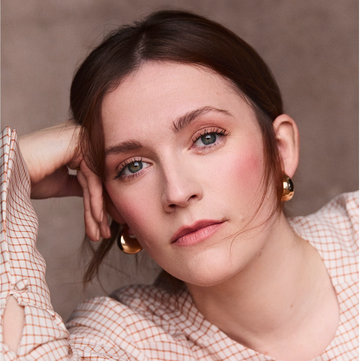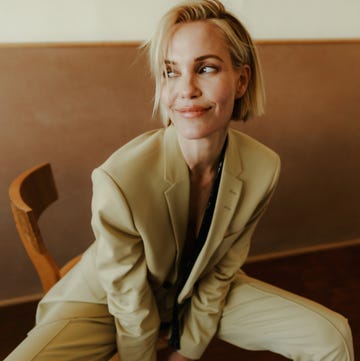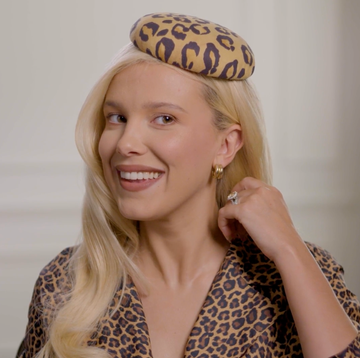Before Michelle Williams signed up for a series that features numerous steamy sex scenes, it was vital she had the backing of her most critical audience: her family. While she says she was immediately enticed by the script for Dying For Sex, the 44-year-old was curious about what her brood (her husband Thomas Kail; their son, five-year-old Hart; and 19-year-old Matilda, Williams’ daughter with the late Heath Ledger) would make of the series – particularly as she was unsure about just how raunchy the show may become.
“When you sign on to a limited series, you don’t have [the scripts for] all of the episodes,” she tells me over Zoom. “I don't know what situations I'm going to find myself in. What are the sexual encounters going to be like? What am I going to be asked to do?
“So I was like: ‘Hey family, I think I'm going to go make this really wild show about sex, and I don't know what's going to happen. Are we cool, are we in for the ride for this one?’ And my amazing family backed me and told me to go for it.”
Williams is adamant that family always comes first – while Dying for Sex was initially meant to be filmed in California, production was moved to New York City for the star to be closer to her loved ones – and filming was delayed once more when Williams discovered she was pregnant with her third child. But when a multi award-winning and five-time Oscar nominee wants to lead your series, you move heaven and earth to make it happen.
While Williams is better known for her numerous and varied film performances, Dying for Sex marks her second role in a prestige TV drama (her first was six years ago in 2019’s Fosse/Verdon, where she won an Emmy for Outstanding Lead Actress for her portrayal of Gwen Verdon - and of course, not forgetting her TV breakthrough in the late nineties classic Dawson's Creek). Based on a true story that became the basis of a hugely successful podcast, Dying for Sex follows Molly (Williams), who discovers that she has been diagnosed with terminal breast cancer. Knowing she only has months left to live, Molly chooses to leave her husband of 15 years and embark on an odyssey of sex and self-discovery.
Williams was not familiar with the Dying for Sex podcast, but that didn't prevent her from deeply connecting with the scripts almost instantly. “I had a really strong emotional reaction,” she says. “When I finished reading it, I had to read it again. I immediately wanted to start acting out these scenes and trying my hand at these jokes. I was smitten.”
The actress believes that Molly’s story is a particularly important one to tell, especially in the current political climate affecting the United States and the wider world at large. Trump’s second presidency, and the worrying growth of the manopshere’s insidious influence in mainstream society, have only underlined how fragile a women’s right to express herself, be it sexually or otherwise, truly has become.
“The show has taken on a whole new meaning [in recent times],” she says. “Storytelling on screen almost served as a guide to living when I was in my formative years. They showed me what was possible, what was permissible. They expanded my senses.
“If these people that I was watching on screen were allowed to explore themselves, be loved and experience learning, growth, good things happening, then the same could be true for me. I think that the way that movies and television hold up a mirror to society gives an opportunity for self-growth and ultimately, self-love and self-expression.”
There is plenty of exploration and expression in Dying for Sex, which has a tongue-in-cheek yet no-holds-barred attitude to Molly’s newfound adventurousness. Viewers are invited to witness Molly’s casual encounters in all their (morning) glory; one episode even sees Molly heading to a kink party. The series marked Williams’ first time ever working with an intimacy co-ordinator; while they are now increasingly commonplace in Hollywood, not all established actors enjoy working with them (just days before we speak to Williams, Gwyneth Paltrow made headlines by saying she felt stifled by an intimacy co-ordinator when filming a sex scene in Marty Supreme with Timothée Chalamet).
“For the kink party episode, we actually had two intimacy co-ordinators on set,” Williams explains. “There was a lot of intimacy to co-ordinate on those scenes.
“When you listen to the podcast and Molly is talking about some of these sexual encounters, there is no shame, there is no guilt. There is only a loving observation of who she met up with and what they did together. She was able to look at these sexual partners and ultimately at herself with love. So I tried to take that perspective to those on-set experiences.”
However, there’s more to Dying for Sex than just sensual exploration; the beating heart of the series is Molly’s close friendship with Nikki, who supports her throughout the diagnosis, the divorce and the experimental new desires. It’s a series about how sisterhood can be a vital life force, so it was important that Williams had a warm, believable chemistry with her co-star Jenny Slate – who is best known for her comedic roles.
“It was easy,” Williams says, of building this bond. “She’s easy to fall in love with. She’s easy to have companionship with, and she makes it easy to laugh at the most difficult things with. It happened really quite naturally.”
But this doesn’t mean it was always easy to be on set, particularly when filming the later scenes, when Molly’s cancer starts to advance. Those moments were often highly charged and draining to commit to camera. Williams found camaraderie with the rest of the cast and crew during these days with a unifying source: food.
“I'm a big believer in it,” she laughs. “Truly, you know what makes people happy? Tacos. Everybody loves pizza on Fridays. I don't know that anything helps morale or brings people together more than a food truck – everybody becomes a child again. And so we leaned very heavily into that.”
While the shoot time for a limited series is far longer than Williams’ usual film roles, the actress believes this was the best medium to do Molly’s story justice. “You're really building a much larger arc for somebody [in a series] than you might be in a film,” she says. “The sheer surface area that you get to touch is so much more vast that it becomes ultimately more rewarding. You just feel closer to the character.
“Molly isn't here to to see what we made and to give it her blessing, but the people who loved Molly, who hold her and who keep her alive in their memories are here. So you owe it to them, to bring this person, in some way, shape or form, back to life for a moment in time. That feels like a big responsibility.”
Now, as Williams reflects on her time during the series, she acknowledges that some of Molly’s character has bled into her own life. “Molly changed the rules,” she says. “With her terminal diagnosis, the marriage that she built, the life that she built, she knocked it all down and kept one thing – her best friend. And I think that kind of bravery to say: 'This is what I'm going to do with my time and my energy and my body. It all belongs to me, and I'm going to use it in exactly the way that I want to, no matter what anybody thinks of me or says about me' is so brave. I like to remember that bravery as a daily practice.”
Dying for Sex is available to stream on Disney Plus from Friday 4 April.
















